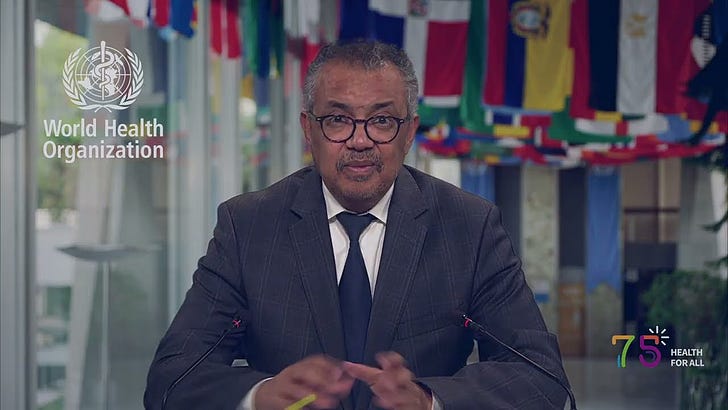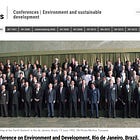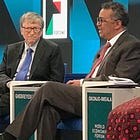Agenda 2030: WHO Head Declares War On Meat And Demands Nations Transition To Plant-Based Diets At COP28
Tedros’ message mostly went unheard at the time but gained some traction online weeks after COP28 concluded.
One-time or recurring donations can be made through Ko-Fi:
“By 2025 we intend to strengthen our respective and shared efforts […] We affirm that agriculture and food systems must urgently adapt and transform in order to respond to the imperatives of climate change,” the declaration at COP28 reads,
World Health Organization Director-General Tedros Adhanom Ghebreyesus issued a short statement during the COP 28 climate summit in Dubai last month, blaming meat and livestock practices for contributing a major amount of emissions.
Tedros’ message mostly went unheard at the time but gained some traction online weeks after COP28 concluded.
In the video the WHO head stated:
Our food systems are harming the health of people and planet. Food systems contribute to over 30 percent of greenhouse gas emissions, and account for almost one-third of the global burden of disease. Transforming food systems is therefore essential by shifting for this healthier, diversified and more plant-based diets.
If food systems deliver healthy diets for all we could save 8 million lives per year. […] WHO is committed to supporting countries to develop and implement policies to improve diets and fight climate change.
[…] I’m therefore very pleased that over 130 countries have signed the code 28 UAE Declaration on climate and health. Together, we can protect and promote the health of both people and planet. Thank you.
As referenced in his video briefing, during COP28, actually 159 countries signed a pact to work to transform their national food systems and agricultural practices, called the “COP28 UAE Declaration on Sustainable Agriculture, Resilient Food Systems, and Climate Action.”
According to a press release the day the pact was announced, COP 28 organizers wrote: ‘Also announced was the mobilization of more than USD$2.5 billion in funding to support food security while combatting climate change and a new partnership between the UAE and the Bill and Melinda Gates Foundation for food systems innovation in the fact of climate change.’
Additionally, Prime Minister of Italy, Fiamē Naomi Mataʻafa, helped to lead the talks, among others; which is worth noting considering Italy just made moves to ban lab-grown and cell-cultured meat in the country in November.
The full declaration is as follows:
WE, HEADS OF STATE AND GOVERNMENT:
Recognizing that unprecedented adverse climate impacts are increasingly threatening the resilience of agriculture and food systems as well as the ability of many, especially the most vulnerable, to produce and access food in the face of mounting hunger, malnutrition, and economic stresses;
Recognizing the profound potential of agriculture and food systems to drive powerful and innovative responses to climate change and to unlock shared prosperity for all;
Underscoring the need to progressively realize the right to adequate food in the context of national food security as well as the need to ensure access to safe, sufficient, affordable, and nutritious food for all;
Noting that agriculture and food systems are fundamental to the lives and livelihoods of billions of people, including smallholders, family farmers, fisherfolk and other producers and food workers;
Noting the essential role of international and multi-stakeholder cooperation, including South-South and Triangular cooperation, financial and funding institutions, trade, and non-state actors in responding to climate change;
Reaffirming our respective commitments, collective and individual, to the 2030 Agenda for Sustainable Development, the UN Framework Convention on Climate Change and the Paris Agreement, the UN Convention on Biological Diversity and the Kunming-Montreal Global Biodiversity Framework, the UN Convention to Combat Desertification, and the Sharm El Sheikh Joint Work on implementation of climate action in agriculture and food security; as well as noting the UN Food Systems Summit;
Recalling also the United Nations Framework Convention on Climate Change and the Paris Agreement, acknowledging that they are the primary international, intergovernmental forums for negotiating the global response to climate change;
Recalling the findings of recent Intergovernmental Panel on Climate Change (IPCC) assessments as well as noting the Synthesis report by the co-facilitators on the technical dialogue of the first global stocktake;
We stress that any path to fully achieving the long-term goals of the Paris Agreement must include agriculture and food systems.
We affirm that agriculture and food systems must urgently adapt and transform in order to respond to the imperatives of climate change.
WE DECLARE OUR INTENT TO WORK COLLABORATIVELY AND EXPEDITIOUSLY TO PURSUE THE FOLLOWING OBJECTIVES:
1. Scaling-up adaptation and resilience activities and responses in order to reduce the vulnerability of all farmers, fisherfolk, and other food producers to the impacts of climate change, including through financial and technical support for solutions, capacity building, infrastructure, and innovations, including early warning systems, that promote sustainable food security, production and nutrition, while conserving, protecting and restoring nature.
2. Promoting food security and nutrition by increasing efforts to support vulnerable people through approaches such as social protection systems and safety nets, school feeding and public procurement programs, targeted research and innovation, and focusing on the specific needs of women, children and youth, Indigenous Peoples, smallholders, family farmers, local communities and persons with disabilities, among others;
3. Supporting workers in agriculture and food systems, including women and youth, whose livelihoods are threatened by climate change, to maintain inclusive, decent work, through context-appropriate approaches which could include increasing, adapting and diversifying incomes;
4. Strengthening the integrated management of water in agriculture and food systems at all levels to ensure sustainability and reduce adverse impacts on communities that depend on these inter-related areas;
5. Maximize the climate and environmental benefits – while containing and reducing harmful impacts – associated with agriculture and food systems by conserving, protecting and restoring land and natural ecosystems, enhancing soil health, and biodiversity, and shifting from higher greenhouse gas-emitting practices to more sustainable production and consumption approaches, including by reducing food loss and waste and promoting sustainable aquatic blue foods;
To achieve these aims – according to our own national circumstances – we commit to expedite the integration of agriculture and food systems into our climate action and, simultaneously, to mainstream climate action across our policy agendas and actions related to agriculture and food systems.
IN FULFILLING THIS COMMITMENT, BY 2025 WE INTEND TO STRENGTHEN OUR RESPECTIVE AND SHARED EFFORTS TO:
1. Pursue broad, transparent, and inclusive engagement, as appropriate within our national contexts, to integrate agriculture and food systems into National Adaptation Plans, Nationally Determined Contributions, Long-term Strategies, National Biodiversity Strategies and Action Plans, and other related strategies before the convening of COP30.
2. Revisit or orient policies and public support related to agriculture and food systems to promote activities which increase incomes, reduce greenhouse gas emissions, and bolster resilience, productivity, livelihoods, nutrition, water efficiency and human, animal and ecosystem health while reducing food loss and waste, and ecosystem loss and degradation.
3. Continue to scale-up and enhance access to all forms of finance from the public, philanthropic and private sectors – including through blended instruments, public-private partnerships and other aligned efforts – to adapt and transform agriculture and food systems to respond to climate change.
4. Accelerate and scale science and evidence-based innovations – including local and indigenous knowledge – which increase sustainable productivity and production of agriculture and related emerging domains, promote ecosystem resilience and improve livelihoods, including for rural communities, smallholders, family farmers and other producers.
5. Strengthen the rules-based, non-discriminatory, open, fair, inclusive, equitable and transparent multilateral trading system with the World Trade Organization at its core.
With seven years remaining to achieve our shared goals, we intend to strengthen collaboration among our respective ministries – including agriculture, climate, energy, environment, finance, and health – and with diverse stakeholders to achieve the objectives and efforts articulated in this Declaration, and as appropriate within our national contexts.
To maintain momentum, we intend to benefit from relevant regional and global convenings in order to share experiences and to accelerate national and collaborative action. We will review our collective progress next year at COP29 with a view to considering next steps in 2025 and beyond.
AUTHOR COMMENTARY
[1] Now the Spirit speaketh expressly, that in the latter times some shall depart from the faith, giving heed to seducing spirits, and doctrines of devils; [2] Speaking lies in hypocrisy; having their conscience seared with a hot iron; [3] Forbidding to marry, and commanding to abstain from meats, which God hath created to be received with thanksgiving of them which believe and know the truth.
1 Timothy 4:1-3
These elitists groups have been hemming and hawing about this stuff for many years now, most of it just being empty threats and statements. But the actions being taken in The Netherlands, and in other places such as Ireland and Germany demonstrate that wackos are very serious and are on the move to totally disrupt the food supply, and destroy agricultural practices around the world, thereby getting the masses to consume less meat.
I believe 2024 will be a very critical and impactful year for these elites to further their goals.
But the masses will never just voluntarily accept this: they MUST be goaded and shocked into it accepting it.
Therefore, I have posited the idea of another shamdemic to justify pulling meat off of the shelves, and slaughtering livestock and wildlife, and vaccinating them to death even more than they already do, to sell deception of this new “plague.”
Furthermore, do not be shocked if the talks and possible implementation of meat and carbon taxes come into the foray.
Source: winepressnews.com
Related articles:












Fuck that guy
You can be sure Tedros won’t be eating bugs. The upper echelons will have wagu beef.